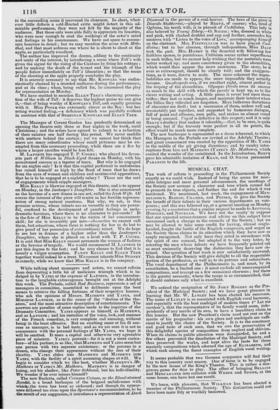MUSICAL CHAT.
THE work of reform is proceeding in the Philharmonic- Society exactly as we could wish. Instead of being the arena for mise- rable intrigue and mere personal advancement, the meetings of the Society now assume a character and tone which cannot fait to promote its true objects, and further the end for which it was instituted. We mentioned, last week, the engagement of MEN- DELSSOHN, BISHOP, CRAMER, and POTTER, to give the Society the benefit of their talents in their various departments as com- posers ; and this was followed up, at a general meeting on Monday evening, by a resolution that a similar request be made to ATTWOOD, HORSLEY, and NOVELLO. We have not the vanity' to suppose that our repeated remonstrances and advice on this subject have occasioned such a change in the councils of the Society ; but we may be allowed to take some credit for having, almost single- handed, fought the battle of the English composers, and urged .on the Society those claims to its attention which they have now so amply recognized. Not only have they acted in accordance with the spirit of our counsel, but adopted it to the very letter, by selecting the men whose talents we have frequently pointed out as most eminently deserving the distinction they have now ob- tained. Our question of last week is now satisfactorily answered. This decision of the Society will give delight to all the respectable portion of the profession, as well as to its patrons and subscribers. The vocal department of the Philharmonic is, and must, by its constitution, be a limited one : it must exclude all unaccompanied compositions, and (except on a few occasions) choruses ; but there is the greater necessity, where the range is so circumscribed, that it should embrace only what is excellent.



























 Previous page
Previous page